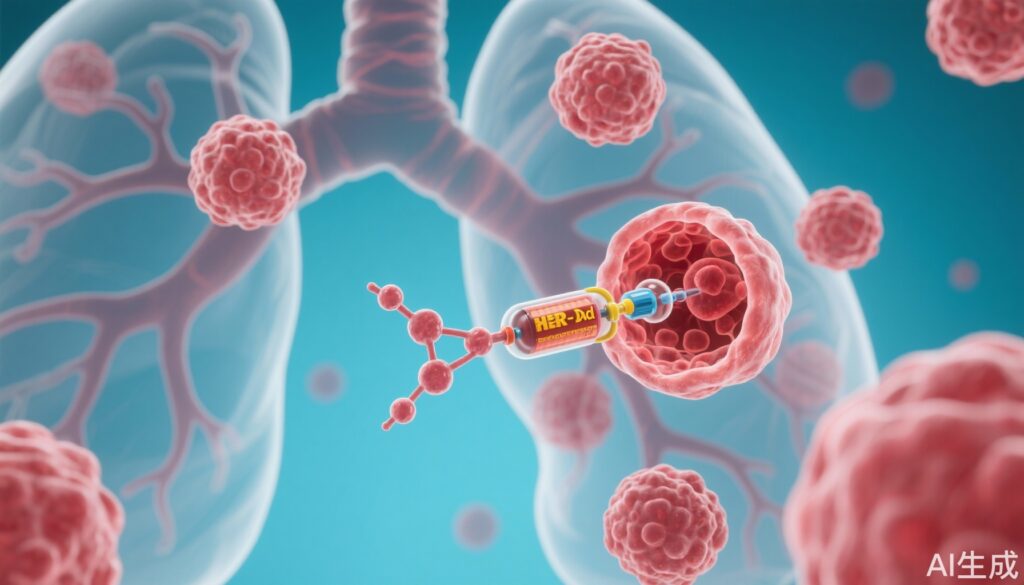Highlight
1. Patritumab deruxtecan (HER3-DXd) is a novel HER3-targeted antibody-drug conjugate showing durable antitumor activity in advanced NSCLC after prior platinum-based chemotherapy and immunotherapy.
2. In a phase II cohort of 47 patients without common EGFR mutations, the confirmed objective response rate was 27.7%, with a median progression-free survival of 5.5 months and overall survival of 15.2 months.
3. Efficacy was observed regardless of the presence of other driver genomic alterations, broadening the potential clinical applicability.
4. Safety profile included manageable treatment-emergent adverse events and a 10.6% incidence of mild to moderate interstitial lung disease.
Study Background and Disease Burden
Non-small cell lung cancer (NSCLC) comprises the majority of lung cancer cases and remains a leading cause of cancer mortality worldwide. Despite remarkable advances in targeted therapies and immune checkpoint inhibitors, prognosis for patients with advanced disease who have progressed after platinum-based chemotherapy and immunotherapy remains poor. Mutation-driven treatments have improved outcomes in subsets with actionable genomic alterations such as EGFR mutations; however, effective therapeutic options are limited for many patients without these alterations or those who become refractory. HER3, a member of the epidermal growth factor receptor family, has been implicated in tumor progression and resistance mechanisms. Targeting HER3 represents a strategic approach to overcome resistance and provide additional treatment options for heavily pretreated NSCLC patients.
Study Design
This investigation was a phase II, open-label clinical trial conducted to evaluate the efficacy and safety of patritumab deruxtecan (HER3-DXd; MK-1022) in patients with advanced squamous or nonsquamous NSCLC lacking common EGFR-activating mutations, whose disease progressed after standard platinum-based chemotherapy, immune checkpoint inhibitors, and targeted therapies when applicable. Forty-seven patients received intravenous HER3-DXd at a dose of 5.6 mg/kg every three weeks. The primary endpoint was confirmed objective response rate (cORR) assessed per RECIST criteria, with secondary endpoints including duration of response, progression-free survival (PFS), overall survival (OS), and safety.
Key Findings
The study population experienced a median treatment duration of 4.2 months (range 0.7 to 19.8 months). The confirmed objective response rate was 27.7% (95% confidence interval [CI], 15.6% to 42.6%), with partial and complete responses observed. The median duration of response was 8.1 months (95% CI, 4.2 to not evaluable), indicating sustained tumor control in responding patients.
Median progression-free survival was 5.5 months (95% CI, 4.0 to 11.2 months), and overall survival reached 15.2 months (95% CI, 10.8 to 17.7 months). Importantly, efficacy outcomes were comparable in patients harboring known driver genomic alterations aside from EGFR mutations and in those without identifiable genomic drivers, suggesting broad applicability across molecular subtypes.
Regarding safety, grade 3 or higher treatment-emergent adverse events attributable to study drug occurred in 51.1% of patients, with serious adverse events in 12.8%, although no treatment-related deaths were reported. Treatment discontinuation due to adverse events was limited to 12.8%. Adjudicated cases of treatment-related interstitial lung disease (ILD) were noted in five patients (10.6%), all being grade 1 or 2, manageable, and without fatal outcomes.
Expert Commentary
Patritumab deruxtecan represents a promising addition to the treatment landscape for advanced NSCLC. Its mechanism — an antibody-drug conjugate delivering cytotoxic topoisomerase I inhibitors specifically to HER3-expressing tumor cells — enables potent tumor targeting with a potentially favorable therapeutic index.
The observed efficacy in a heavily pretreated, molecularly heterogeneous cohort addresses a critical unmet need. The 27.7% objective response rate and favorable survival metrics are clinically meaningful in this context. Safety findings, including the manageable profile of ILD, are consistent with other antibody-drug conjugates and highlight the importance of vigilant monitoring.
Limitations of the study include the modest sample size and single-arm design, which warrants confirmation in randomized trials. Furthermore, although efficacy is seen broadly, future research is needed to better characterize predictive biomarkers of response and to optimize combination strategies with existing agents.
Conclusion
Patritumab deruxtecan (HER3-DXd) demonstrates noteworthy antitumor activity and an acceptable safety profile in advanced NSCLC patients post platinum chemotherapy and immunotherapy, extending benefits beyond the EGFR-mutated subset. These findings support further clinical development and potential incorporation into treatment pathways for refractory NSCLC, promising to improve outcomes in this challenging patient population.
References
Steuer CE, Hayashi H, Su WC, Nishio M, Johnson ML, Kim DW, Massarelli E, Felip E, Gold KA, Murakami H, Baik CS, Kim SW, Smit EF, Fujimura M, Fan PD, Truchon K, Su X, Sternberg DW, Jänne PA. Patritumab Deruxtecan (HER3-DXd; MK-1022) in Non-Small Cell Lung Cancer After Platinum-Based Chemotherapy and Immunotherapy. J Clin Oncol. 2025 Sep;43(25):2816-2826. doi: 10.1200/JCO-24-02744. Epub 2025 Jun 24. PMID: 40554742; PMCID: PMC12393064.
Hirsch FR, Scagliotti GV, Mulshine JL, et al. Lung cancer: current therapies and new targeted treatments. Lancet. 2017;389(10066):299-311.
Sequist LV, Yang JC, Yamamoto N, et al. Phase III study of afatinib or cisplatin plus pemetrexed in patients with metastatic lung adenocarcinoma with EGFR mutations. J Clin Oncol. 2013;31(27):3327-34.



